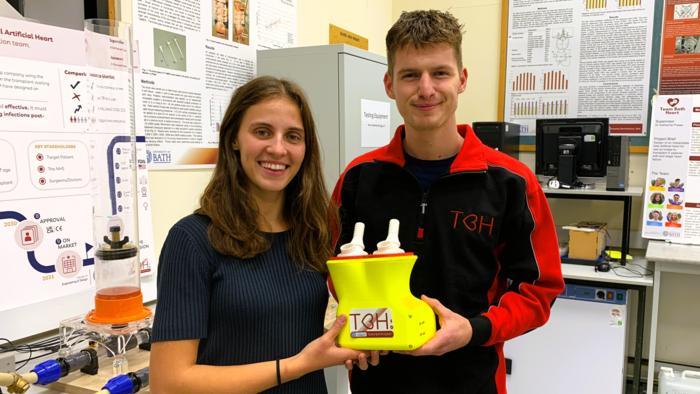
Student engineers from the University of Bath have taken the top prize at the grand final of the inaugural Heart Hackathon, an international competition to design an artificial heart held in Texas at the end of October.
Six members of Team Bath Heart presented their device to global experts in artificial heart technologies, competing against teams from Australia, the USA, Sweden, New Zealand, Romania and Egypt.
The ‘total artificial heart’ prototype they developed could in theory be used to replace a heart patient’s organ. Artificial hearts are used in medicine to treat patients with certain cardiovascular diseases, usually while they wait for a donor heart to be found, or to help their heart recover.
The team’s winning design, currently a scaled-up prototype, incorporates cutting-edge materials and features a bag-pumping mechanism to achieve sophisticated blood handling characteristics as well as automatic flow-rate adjustment to respond just as a real heart does.
During the competition, which aims to encourage the medical and cardiovascular innovators of the future, team lead Fleur Upton (pictured above, at left) and technical manager Alex Myers had to deliver a 15-minute presentation, before all six students were quizzed on their design choices by a panel of expert judges.
Each team was scored on the quality of their research, technical innovation and commercialisation efforts. The uniqueness of the Team Bath Heart design, which put patient needs at the centre of decision making, helped them stand out from their competitors.
Now comprising 45 students studying courses in engineering, computer science, biology and management, Team Bath Heart was established in early 2022 when six members of the team took on the challenge of creating an artificial heart as part of a group project.
‘We are immensely proud to have won first prize at the Heart Hackathon,’ said Upton, who is studying mechanical engineering. ‘It was great to meet the other teams and learn about the different ways in which everyone approached the challenge, and how they innovated in different ways. Getting to work on the project has been incredibly rewarding, so to win the competition is really the icing on the cake.’
‘It was a tough competition with several excellent designs from the competitor teams,’ said Katharine Fraser, one of Team Bath Heart’s academic advisors and a senior lecturer in mechanical engineering. ‘Team Bath Heart won because they analysed the needs of patients and clinicians, used everything they’ve learnt in their degrees so far, and put in a huge amount of time and effort to create their completely new, innovative total artificial heart. We’re all very proud of the team and what they’ve achieved. Medical engineering and technologies like these have massive industrial potential, so as well as gaining great problem-solving and management experience in entering the competition, the team are also building really relevant skills for their future careers.’
Following the Heart Hackathon contest, members of the team attended the International Society for Mechanical Circulatory Support conference, a meeting of the world’s top experts in artificial-heart and blood technologies to learn more about the field and to connect with industry professionals.
The team is now starting development of the next iteration of their design, with the aim of competing again at the 2024 Heart Hackathon final.



